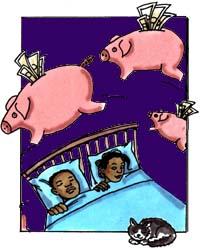Living Below Your Means, part 2

Find prosperity in ordinary envelopes. That's right, if you've gathered the data outlined in part one of this article, you're ready to move your family to a mostly-cash economy. This will almost certainly, if you do nothing else, limit your spending.
Since you've written down everything you spent, you have a good idea of what your expenses are, both fixed and variable. Some costs you cannot lower. Rent, mortgage, car payments, insurance, all these were determined before now. Utilities vary only slightly. Presumably you're doing everything you can to lower them, like keeping thermostats turned low and not running every light in the house.
Beyond fixed costs, however, lies a great area of flux. You know what you have been spending in each category, but now you get to choose. How much do you want to spend? Generally, it's wise to not stray too far from your past patterns. Unless you're facing eviction and dunning notices, you probably don't have to slash costs drastically at first.

The next part of this system works against our tendency to make transactions invisible. Now that you've established written levels of spending for your categories, you'll need some kind of envelope. This can range from the plain paper kind to specialized resealable plastic currency envelopes. You'll need enough to match your categories. Label an envelope for each category. Into each one, put the amount you've budgeted--in cash.
For many of us, checks, credit card slips, debit cards, all seem like play money. You know it's real money, of course, but it doesn't have the visceral impact of paper and coin. When you pay for an item, really look at the money in your hand. Visualize how long it took to earn. Feel the edges of the coins, crinkle the bills. With this system, you're really spending money when you spend.
Should you cut up your credit cards? As with many things in life, it just depends. How much do you "need" them? Can you keep them in your house and not use them? Would you feel safe having a friend or relative hold them for you? There are many financial advice-givers who would have you scissor up your credit cards immediately. For some, that may be the only way to stop using them to spend money you don't have. If you can exercise reasonable control, then I'd suggest merely not carrying credit cards. Unless you have a year's worth of salary in a readily-available form such as a money market account, a credit card might be the thing you need in a real emergency.
Some people who prefer the convenience of a credit card for things like purchases over the internet use their bank debit card. The money comes immediately out of your account, so theoretically you cannot overspend. For the first couple of months on this system, however, I'd suggest that whenever possible use cash.
As with any system, the first few months are a time of fine-tuning. If you find yourself stealing from the pets envelope to pay for groceries, then you'll want to reevaluate your amounts. Once you're close to what you'd like to be spending, however, you don't have to write down what you're spending the money on. If money is there, it's available. If not, you don't have it to spend.
Best of all, you don't have to feel guilty for what you spend. Since it's predetermined, you can allow for that Friday latte with friends. You determine what importance various items have. If your family gets great pleasure from dining out, by all means, budget for it.

One possible bonus from this system is the transparency it lends to your budget. Your children, depending on their ages and understanding, can participate in financial decisions. Kids can understand "We agreed that we'd spend $50 a week at the grocery store, and we have. So I don't think we're going to buy candy unless you can find a way to get our groceries for less."
Wheedling treats out of people who seem to have unlimited spending power makes sense. Nipping bits of one's own budget doesn't. Discover the fun of encouraging each other to forego unnecessary purchases. Families can find great unity from identifying a goal, whether it be an item, a vacation, or a house, and saving towards it.
Never lose sight of the real goal. You want to spend less, perhaps significantly less, than what is coming in. Creating an envelope for saving or investing and making that a cash expenditure can make it the priority you want.
Using these envelopes should allow you to notice the places where you can trim costs. Start with a modest goal--spending 5% less on each variable category. Books like Amy Dacyczyn's Tightwad Gazette series are full of tips to squeeze more from your money. Add that amount to your saving envelope each month. If that works, try for 10% or 15%. If you'd like to retire early, you may have to live as much as 25% below your income. Practicing restraint comes more easily with time. Enjoying not having money worries is easy from the start.
Contributing Editor Stefani Leto writes and parents in the Bay Area. Mother of an almost-five year old and an infant, she says nothing challenges her mind like parenting. Her work also appears at http://www.windowbox.com and
http://www.folksonline.com/folks/ts/1998/pph.html.
